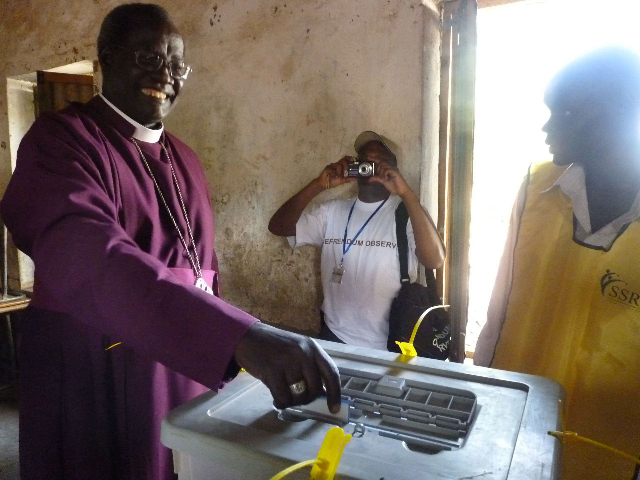Personal stories from the Sudan vote

As we now know, despite some conflict around Abyei, the Sudan Referendum passed off peacefully and credibly in Southern Sudan. Although the official results of the Sudan Referendum will not be published until 14th February the current figures point to a massive vote for secession:
98.81%
have voted Secession that’s 3,734,280 people.
While only...
1.19%
have voted for Unity - 44,830 people.
The February date allows time for any objections and challenges of the voting to be addressed.
Please continue to remember Sudan and in particular our Global Partners as they await the final outcome on 14th February.
Voting Stories...
In Sudan
On the opening day of the Referendum, Archbishop Daniel Deng, Episcopal Archbishop of Sudan travelled to Hai Jalaba Junior School polling station, along with Archibishop Lukudu of the Roman Catholic Church. After greeting other voters and receiving a brief explanation from voting officials, the Archbishops cast their votes.
Afterwards, Archbishop Deng shared his elation at having finally cast his vote, saying "We have been waiting fifty five years for this day. This is our day, this is our time." The Archbishop reflected that the referendum was a bridge to a new Sudan, and that today
marked the start of an important event in the history of Sudan. He commented that all Sudanese had now proved to the world that they could reach this day peacefully.
"This is our day, this is our time" Archbishop Deng
In Europe
Many miles from Sudan, Sarah Duku (Pictured Right), originally from Kajo Keji Diocese and now living in Drogheda, cast her vote in London - the only polling station in Europe for the 653 Sudanese Nationals who registered to vote in the referendum. Sarah described the act of casting her vote as 'an historic moment.' And she is optimistic about the future, believing that while an independent Southern Sudan will still have to deal with inter-tribal disputes, there is less chance of a return to civil war with the north.
Sarah, who lives in Drogheda, is mother to three-year-old Waran. Her parents live in Northern Sudan, having fled their home in Kajo-Keji for Khartoum during the last civil war. This ended with the signing of the 2005 Comprehensive Peace Agreement.
Her mother visited her at the end of last year, but returned to Sudan before the referendum got underway on January 9. “The Southerners in Khartoum have moved back in great numbers, many are living in camps waiting for transport back to Juba,” she said. “My mother wants to return south but my father has a farming business in eastern Sudan so he is stuck. We are concerned that if the South opts for secession, come January 9 and the dissolution of the current government we will not have citizenship or trading rights in the North.”
Sarah said she was confident the referendum would result in independence for Southern Sudan, but acknowledged that there are still difficult times ahead. “I know that in any country, particularly in Africa, there is corruption, and within Sudan we have very many tribes. That is a huge worry, and the situation in Abyei is a worry, but we are hopeful after hearing the promise of the President that there will not be another civil war,” she said.
“I am confident that my vote will count,” she said. “I felt it was just so important to vote. For me it is a historic moment and I wanted to be part of it.”